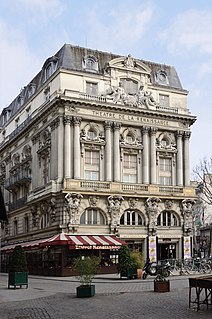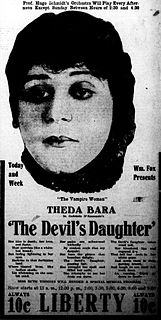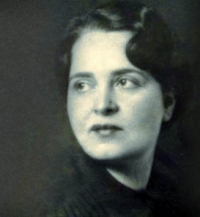Related Research Articles

Leslie Claire Margaret Caron is a French-American actress and dancer. She is the recipient of a Golden Globe Award, two BAFTA Awards and a Primetime Emmy Award, in addition to nominations for two Academy Awards. She is one of the last surviving stars from the Golden Age of Hollywood cinema.

General Gabriele D'Annunzio, Prince of Montenevoso, sometimes written d'Annunzio, was an Italian ultra-nationalist, poet, playwright, orator, journalist, aristocrat, and army officer during World War I. He occupied a prominent place in Italian literature from 1889 to 1910 and later political life from 1914 to 1924. He was often referred to under the epithets Il Vate or Il Profeta.

Arrigo Boito was an Italian poet, journalist, novelist, librettist and composer, best known today for his libretti, especially those for Giuseppe Verdi's last two monumental operas Otello and Falstaff and his own opera Mefistofele. Along with Emilio Praga and his own brother Camillo Boito, he is regarded as one of the prominent representatives of the Scapigliatura artistic movement.
The year 1916 in film involved some significant events.

Silvana Mangano was an Italian film actress. She was one of a generation of thespians who arose from the neorealist movement, and went on to become a major female star, regarded as a sex symbol for the 1950s and '60s. She won the David di Donatello for Best Actress three times - for The Verona Trial (1963), The Witches (1967), and The Scientific Cardplayer (1973) - and the Nastro d'Argento for Best Actress twice.

Eleonora Giulia Amalia Duse, often known simply as Duse, was an Italian actress, rated by many as the greatest of her time. She performed in many countries, notably in the plays of Gabriele d'Annunzio and Henrik Ibsen. Duse achieved a unique power of conviction and verity on the stage through intense absorption in the character, "eliminating the self" as she put it, and letting the qualities emerge from within, not imposed through artifice.
La Dame aux Camélias is a novel by Alexandre Dumas fils. First published in 1848 and subsequently adapted by Dumas for the stage, the play premiered at the Théâtre du Vaudeville in Paris, France, on February 2, 1852. It was an instant success. Shortly thereafter, Italian composer Giuseppe Verdi set about putting the story to music in the 1853 opera La traviata, with female protagonist, Marguerite Gautier, renamed Violetta Valéry.

Ildebrando Pizzetti was an Italian composer of classical music, musicologist, and music critic.

Alida Maria Laura, Freiin Altenburger von Marckenstein-Frauenberg, better known by her stage name Alida Valli, was an Italian actress who appeared in more than 100 films in a 70-year career, spanning from the 1930s to the early 2000s. She was one of the biggest stars of Italian film during the Fascist era, once being coined "the most beautiful woman in the world" by Benito Mussolini, but managed to find continued international success post-World War II. According to Frédéric Mitterrand, Valli was the only actress in Europe to equal Marlene Dietrich or Greta Garbo.

The name Théâtre de la Renaissance has been used successively for three distinct Parisian theatre companies. The first two companies, which were short-lived enterprises in the 19th century, used the Salle Ventadour, now an office building on the Rue Méhul in the 2nd arrondissement.

The Devil's Daughter is a lost 1915 American silent drama film directed by Frank Powell and starring Theda Bara. Based on the 1899 play La Gioconda by Italian writer Gabriele D'Annunzio, this updated adaptation portrayed the story of vengeful woman—a "vamp"—who uses her beauty and sensuality to lure a young man to ruin, destroying both his marriage and his career as an artist. The film was produced by Fox Film Corporation and shot at the company's studio in Fort Lee, New Jersey and on location in St. Augustine, Florida.

Arnoldo Foà was an Italian actor, voice actor, theatre director, singer and writer. He appeared in more than 130 films between 1938 and 2014.
La Gioconda may refer to:

Frances Winwar(néeFrancesca Vinciguerra; 3 May 1900 – 24 July 1985), was a Sicilian-born American biographer, translator, and fiction writer.

Alba Arnova was an Italian-Argentine ballerina and film actress.

Quo Vadis is a 1924 Italian silent historical drama film directed by Gabriellino D'Annunzio and Georg Jacoby and starring Emil Jannings, Elena Sangro, and Lillian Hall-Davis. It is based on the 1896 novel Quo Vadis by Henryk Sienkiewicz which was notably later adapted into a 1951 film.
Eleonora Duse is a 1947 Italian biographical film directed by Filippo Walter Ratti and starring Elisa Cegani, Rossano Brazzi and Andrea Checchi. It portrays the life of the celebrated Italian actress Eleonora Duse (1858–1924). The film was based on the novel La grande tragica by Nino Bolla.
Francesca da Rimini is a 1901 play by the Italian writer Gabriele d'Annunzio. It tells the story of how Francesca da Rimini falls in love with her brother-in-law in the 13th century.
The Flame is a 1900 novel by the Italian writer Gabriele D'Annunzio. It is set in 1883 Venice and tells the story of a young artist and his mistress, a famous but quickly aging actress. The story was inspired by D'Annunzio's relationship with the actress Eleonora Duse. The novel contains expositions of many of D'Annunzio's theories about drama, largely inspired by Friedrich Nietzsche and Richard Wagner.

The Bad Poet is a 2020 Italian biographical-drama film directed by Gianluca Jodice. The film is inspired by the book by the Italian journalist and writer Roberto Festorazzi, "D'Annunzio and the Fascist Octopus", first published by Minotauro in 2005 and republished by Silicio-Editoriale Lombarda in 2020. The film focuses on the last years of the poet Gabriele D'Annunzio, played by Sergio Castellitto, and on his ambiguous relationship with fascism.
References
- ↑ "The Duse of Today A Mold of D'Annunzio: Great Italian Actress Reappears in 'La Gioconda'", review, The New York Times , November 5, 1902, p. 9. ProQuest Historical Newspapers.
- ↑ The Complete Index to Literary Sources in Film. 1999. p. 105.
- ↑ Diccionario de escritores mexicanos, siglo XX: M (in Spanish). 1988. p. 41.